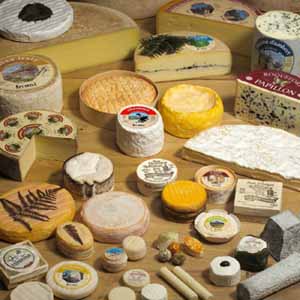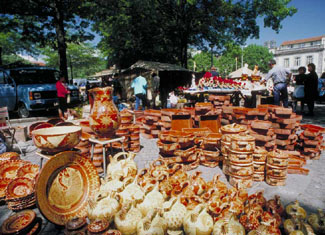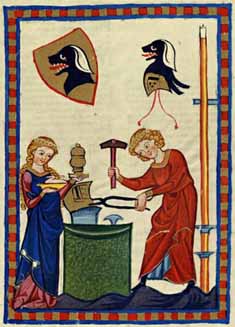 |
Organic Society
Restoring a Closed Economy
Plinio Corrêa de Oliveira
We have to imagine what would have happened in the world if not only the moral values were different, but also the type of production and consumerism. They would have generated a different kind of progress.
I believe that a world with many local products and only few products coming from other countries would be a much richer world than the one dominated by global production. For example, let us look at the Philippines. That country has thousands of small islands. The actual land space is proportionally small in relation to the waters that surround those islands. Now, let us imagine if the Philippines were to live entirely from their own resources – without any external contacts. The people would take much more advantage of their limited resources and would enjoy a lifestyle in consonance with them. As their cultural life would develop and improve, they would come to have very beautiful works of art, sound traditions and customs based on local characteristics.

The variety of cheeses in France was only possible due to its healthy regionalism |
If peoples throughout the world were to live from their own local resources and no longer rely on international commerce, the world’s wealth would be much greater than what is generated by the process of mass production and the global circulation of goods.
Consider Europe, where local characteristics still exist to a greater extent. They are being destroyed by the European Union, but nonetheless they still exist. The local cuisines, for example, are extremely rich and distinct. In each region of France you have a different cuisine with its own specific characteristics; likewise, in Spain, Portugal, and other countries. Those dishes developed to fit the soul of each country, and then each region inside the country, so that each people find a delight in the special dishes of their regions.
How can someone pretend that food in cans or fast food, which have been imposed on everyone everywhere by global commerce, is richer than those regional European cuisines? It is impossible. The regional cuisines are incomparably richer and better than the former. The same occurs in the other cultural spheres.
Temperance induces a healthy regionalism

Barcelos' excellent ceramic pottery is famous all over Portugal |
When the atmosphere of a region is perfectly suited to the soul of the people, the inhabitants of that area are content and have no desire to buy things from another corner of the world. Why should a man from Portugal who has all that he needs in his own land want products made in Japan?
I believe it is a lack of temperance that makes a people become discontent with what fits their particular psychology and mentality, and constantly long for things made in the four corners of the world.
Thus, a lack of temperance is an important factor that moves international commerce. If there were more temperance in the picture, each one would be content with the regional products and styles that express his soul, mentality and culture.
Here, again, we find a moral problem at the base of an economic problem.
A progress based on local customs
The cultural ambience in which a man lives should develop based on customs that extend through generations and what the land around him gives him to express his own psychology. He will always find ways to express his psychology in his local land. The first Dutchman or Englishman - I’m not sure which one – who tasted juniper and realized he could make an exquisite spirit like gin from it probably would never have invented this drink if he had been importing beverages from all over the world.

Whisky became one of the marks of Scotland |
The same could be said about the Scots and their whisky, a spirit which if I am not mistaken goes back to the monks of the early Middle Ages. How would they find the best way to produce their famous spirits if they were not looking for the best advantage to take from the grains produced in their own regions?
Let me stress that there was also a great intellectual effort made by those men who first tasted such local herbs or grains and imagined the final products – those superb spirits they distilled. In fact, the process to reach that ideal at times is the fruit of an effort of several generations. And, at the end of that process, we see that some of the traits of the Scottish and English psychologies are duly reflected in their whisky and gin. They could never have produced those works of art in the realm of drinking if they had been part of a global economy. Who cannot see that a Scotsman or Englishman has nothing to do with the vodka he imports and drinks today?
What defect makes a man turn away from his own regional ambience and goods and jump into an anonymous cosmopolitism? It is a greed for the goods of others that he doesn’t possess.
Thus, the virtue of temperance leads a man to be satisfied with what he has in his own land and region. This same virtue creates a cultural atmosphere that helps him to best develop his intelligence and psychology. Without temperance, it is almost impossible for him to avoid falling into the frenzied mentality of our modern economy, which lives from and exacerbates the defects of savage capitalism.
I believe that the closed economy is not a fantasy or daydream. With less desire to progress horizontally and more desire to progress vertically, wouldn’t we have avoided all this modern agitation and have achieved greater stability?
Love of perfection: base of organic growth

A blacksmith forging armor for his noble |
Another fundament of the work and economy in an organic society was a metaphysical love of perfection. A worker would have a certain proportional concern about profit in order to make a living for himself and his family, but his preponderant desire was to make a perfect work.
Each man in each profession was aiming to achieve his master work. The ideal of a blacksmith in forging the perfect sword was to forge an exquisite piece of art as well as a strong weapon able to resist any blow. The shoemaker strived to make the perfect pair of boots – well crafted and well designed – for his noble client. And until the workman attained that degree of perfection he had conceived, he would not rest. At depth that search for perfection was a metaphysical translation of the love of God.
Without this tonic note of the quest for perfection, we cannot imagine an organic society. With it, it is easy to resist the temptation of international commerce and build something very different and much better. Without it, it is almost impossible not to fall into the savage frenetic state in which we live today.

Posted February 9, 2009

  | | Prof. Plinio |
Organic Society was a theme dear to the late Prof. Plinio Corrêa de Oliveira. He addressed this topic on countless occasions during his life - at times in lectures for the formation of his disciples, at times in meetings with friends who gathered to study the social aspects and history of Christendom, at times just in passing.
Atila S. Guimarães selected excerpts of these lectures and conversations from the trancripts of tapes and his own personal notes. He translated and adapted them into articles for the TIA website. In these texts fidelity to the original ideas and words is kept as much as possible.

Related Topics of Interest
 What America Eats - A New Tendency Sprouts What America Eats - A New Tendency Sprouts
 Opposed Poles of Society: Prestige and Money Opposed Poles of Society: Prestige and Money
 Proportion between the City and the Man Proportion between the City and the Man
 Critique of Capitalism from an Organic Perspective - Part I Critique of Capitalism from an Organic Perspective - Part I
 The Harmful Mentality of Borrowing Money - Part II The Harmful Mentality of Borrowing Money - Part II
 Vocations of the European Peoples Vocations of the European Peoples
 Revolution and Counter-Revolution in the Tendencies, Ideas, and Facts Revolution and Counter-Revolution in the Tendencies, Ideas, and Facts

Related Works of Interest
|
|
Organic Society | Social-Political | Home | Books | CDs | Search | Contact Us | Donate

© 2002-
Tradition in Action, Inc. All Rights Reserved
|
 |
|